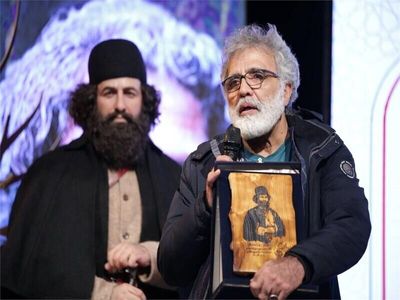The ceremony was attended by Minister of Culture and Islamic Guidance Mohammad-Mehdi Esmaeili and a number of cultural officials, IRNA reported on Friday.
At the ceremony, the Mirza Award of the Year was given to Iranian filmmaker Behruz Afkhami for his 1987 TV series “Kuchake Jangali” one of the most important pieces of work that contributed to the durability of the forest movement and Mirza Kuchak Khan, an early twentieth-century revolutionary, through art.
Musician Seyyed Mohammad Mirzamani also received an award for the series score, while sculptor Hamid Kangarani was honored for creating a statue of Kuchak Khan.
Moreover, a commemorative postal stamp of the national figure was unveiled during the ceremony.
Born Yunes, Mirza Kuchak Khan (1880-1921), established the movement in the forests of Gilan that became known as the Jangal (Forest) Movement in response to the period of political decay brought about by the advent of World War I and the occupation of Iran by Anglo-Russian and Ottoman troops.
The uprising started in 1914 and remained active until 1921 when the movement was defeated.
It laid the ground for a popular movement in the northern part of the country. In this period, the Iranian people were grappling with social unrest, anarchy, political turmoil, abject poverty, famine, and numerous other problems.
After Reza Khan took power in 1920, he issued a highly classified document requesting high-ranking security officials to deliver Mirza Kuchak to him, dead or alive, offering a large reward to whoever did so.
This secret document shows that the king of Iran was desperately seeking to suppress the Jangal Movement as soon as possible to crack down on the new freedom movements mobilized in different parts of Iran.
Mirza and his companion named Gaouk, a Russian-German revolutionary adventurer, fleeing from the central government forces both died of frostbite in the Talesh mountains near Masal on December 2, 1921.
Source:Tehran Times

